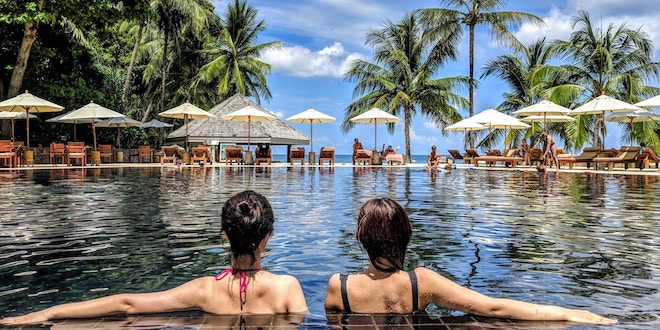Last Updated on November 18, 2023
Planning a vacation requires many considerations. This article offers useful travel planning tips that will enable you to turn your dream trip into reality.
Before starting to plan a trip, it is wise to put aside money in savings accounts in order to ensure you have enough funds available so as to enjoy every moment of it without incurring financial strain. Saving up enough money allows for smooth sailing while relieving any financial pressures or stress during your adventure.
Choosing Your Destination
Once you have made the decision to travel, the next step should be deciding where you want to go, right after what Cathay Pacific flights to take. Many factors go into this decision such as your budget and desired type of trip; weather, food options and safety conditions of each destination should all be taken into consideration before selecting one as your destination.
If you need some advice about where to begin your trip, ask friends and family members for suggestions. They could give you ideas that go beyond what you expect, helping you identify the ideal spot.
Be open-minded when selecting your destination. A place that may seem foreign could provide an unforgettable experience that you never anticipated; the only way to know is if you give it a go! Exploring new places could prove highly enjoyable!
Researching Your Destination
Researching your destination is one of the key components of travel planning, helping you avoid tourist traps, uncover hidden treasures and immerse yourself in foreign cultures. Informed decisions regarding safety and budget can also be made with this knowledge at hand.
Doing research can also help you determine whether or not any vaccinations or medical precautions will be necessary when travelling abroad, saving time and hassle upon arriving at your destination.
Social media and online resources can be great starting points for your research process. Here you can find reviews and photos of attractions as well as climate, culture, food, public transport and language details. Additionally, asking friends and family for advice from destinations they have visited before is another useful strategy; their experiences can serve as rough guides and help narrow down your options.
Making a Rough Itinerary
Once you know where you want to travel, the next step should be creating an itinerary. This will allow you to stay on top of everything and ensure everything is covered.
Take along a map. This is particularly important if you’re on a road trip or visiting locations where cell service may be limited, or getting an inexpensive prepaid smartphone and adding an international SIM to it in advance.
Some travelers prefer to make spontaneous decisions and forgo an itinerary entirely, which can be an excellent way to discover hidden gems off-the-beaten-path and uncover gems you might otherwise miss. But be careful; doing this requires discipline and street smarts – if doing this is comfortable to you then go for it – plus, this allows flexibility!
Packing for Your Trip
Packing for a trip can be stressful. Being prepared is essential, but overpacking should be avoided to avoid unnecessary weight and hassle on your journey. Try creating a list of everything you think will need before going through and eliminating anything non-essential; or pack an essential capsule wardrobe full of pieces you can combine together for various looks.
For instance, a medium-sized Eminent suitcase is similar in size to many other brands, providing an average storage capacity suitable for most travelers. When you use packing cubes and compression sacs inside, such as in any medium-sized suitcase, the organization becomes even more straightforward and space-effective. Plus, these will enable you to find what you’re searching for more easily when needed! Additionally, bring extra items such as sunscreen or bug spray in case they may be hard to come by once at your destination.
Booking Your Transportation
One of the key aspects of planning a vacation is ensuring you have safe and convenient ways of transportation. Depending on where you’re heading, this could involve booking an airport transfer, renting a car, or finding appropriate public transit options for your destination. When selecting your mode of transport it’s also essential to keep safety top of mind; whenever possible it is always best to travel with someone as this helps minimize risks while on holiday.
Saving Money
No matter if it’s an extravagant vacation or budget backpacking journey, saving money for travels is essential. One way of doing this is creating a spreadsheet or downloading a budgeting app and tracking expenses to see where and how your money is being spent so that changes can be made accordingly.
One effective strategy to save money is setting and adhering to a savings goal, which will keep you accountable and on track towards reaching your travel goals. You may also consider cutting costs by negotiating with cable, internet and cell phone providers; many will offer lower rates in exchange for staying loyal – helping you save even more for your travel plans!
Staying Organized
Organization is key when traveling, both for your own sake and those you are traveling with. Not only will it ensure you don’t forget anything important, but also for making packing, traveling and unpacking much smoother.
One way to stay organized while traveling is by creating a staging area for your travel items. A staging area should serve as a repository where all items you plan on taking should be collected one week before departure so that you can keep track of what’s packed, make any adjustments before it’s time for you to depart, and perhaps change up some items before it comes time to go!
NYC Professional Office Organizer Joanna Teplin from Netflix’s The Home Edit has shared some helpful advice for staying organized when packing, traveling and unpacking. Take note – you won’t regret it. Enjoy your travels! xoxo
Staying Safe
Staying safe when traveling abroad is of utmost importance when planning any trip. Always remain aware of your surroundings and trust your instincts, especially if traveling solo or alone. Predators tend to target travelers who appear timid or vulnerable, so keeping alert and vigilant is vitally important. Also make sure someone back home knows your itinerary and where you will be staying.
Other common travel risks include health concerns, scams and transportation problems. To be prepared, be sure to pack enough medicine, water disinfection tablets and first aid supplies as well as a first aid kit for your trip. It is wise to avoid situations that put yourself in vulnerable positions such as hanging out with strangers or going to unsafe areas if possible and be sure to scan all valuables including passports before you depart so if anything should happen during your journey you’ll still have an electronic copy available should anything arise during travel.
Immersing Yourself in the Culture
An authentic cultural experience requires more than simply visiting the top sights in a country; it requires developing an in-depth knowledge of its people and way of life and adopting some elements into your daily routine – this may mean trying local cuisine, learning some basic phrases in its native tongue and staying at accommodations owned by local families.
Try signing up for a local language class or joining an online travel community to meet locals face-to-face and practice your skills. Also be mindful to respect local customs and not commit cultural faux pas!
Planning a trip can be intimidating, but with these easy tips you can reduce stress and make your dreams of travel come true! Just don’t forget your passport! Zoe Stephens.
Connecting With the Locals
To fully immerse yourself in a culture, it is essential that you form relationships with the locals. This may simply involve talking to locals but could also involve volunteering or finding employment in the community.
If traveling alone, try to blend in by dressing appropriately for the climate and forgoing flashy jewelry or electronic devices that may draw unwanted attention from thieves. Doing this will allow you to gain more of an experience of your destination through its people.
Home Exchange and CouchSurfing provide another great way to meet locals by connecting travelers with those willing to offer accommodation or other services in their hometown, creating opportunities for lifelong friendships as well as deeper understanding of culture.
 Travel for Food Hub The Food Blog for Travel Lovers
Travel for Food Hub The Food Blog for Travel Lovers















